On Oct. 14, 2016, the U.S. Chamber of Commerce, the EB-5 Investment Coalition, and the Real Estate Roundtable hosted a briefing on the EB-5 Investment Program on Capitol Hill, with the objective of discussing and informing House and Senate staff members on the inner workings of the program and the potential impact the Dec. 9, 2016 expiration date has on the community. Duane Desiderio, Senior Vice President and Counsel at the Real Estate Roundtable, moderated the panel, and began the discussion by describing the basic requirements to qualify for an EB-5 visa and the types of projects that utilize EB-5 investment, ranging from developments in rural areas, infrastructure projects, to charter schools.
Theresa Brown, from the Bipartisan Policy Center (BPC), spoke at the briefing and focused on the many joint public-private partnerships that utilize EB-5 capital to fund needed developments in cities and municipalities. The BPC published a report, “EB-5 Program: Successes, Challenges, and Opportunities for States and Localities” that showed the impact of the EB-5 program in state and local projects- a conservative calculation of EB-5’s national economic effects accounted for $11 billion in investment and 77,000 jobs created. In addition, according to the BPC, the projects are much needed in these areas, including public infrastructure, and affordable housing projects.
Gregory Wing, Founder of Education Fund of America, also spoke at the briefing. Mr. Wing has utilized EB-5 capital to help finance 26 charter schools over 7 different states. He discussed the impact of EB-5 capital on those schools and how, without the funding, the schools would not be in existence. He also spoke on how this affects children who need schools that have sufficient funding to operate.
Angelique Brunner, Founder and President of EB-5 Capital, described the projects in Washington D.C. in which she has been involved that have now transformed the D.C. economic landscape. She discussed utilizing EB-5 capital starting in 2007, when banks were not lending money due to the recession. She explained that through the use of EB-5 capital, the company was able to fund projects that have earned awards from the Urban Land Institute.
Dan Healy, Chief Executive Officer of Civitas Capital based in Dallas, Texas, discussed how the EB-5 investment program costs U.S. taxpayers nothing. In fact, the same investors who initially invest in the EB-5 program will often reinvest with other projects in the United States that are not related to immigration programs, after they have received their green cards. EB-5 investors who eventually move to the U.S. as lawful permanent residents will pay U.S. federal income tax on their worldwide income, and their worldwide assets are likely also subject to U.S. federal gift and estate tax rules.
The briefing ended with lively discussion and questions from House and Senate staff members, including the myth that the EB-5 program is “buying” U.S. citizenship, which has been debunked, and questions regarding potential program lapse and retroactivity issues within the new bills. For more information on the EB-5 program, please visit the EB-5 Investment Coalition’s website.
http://www.natlawreview.com/article/briefing-eb-5-investor-program-0
Mentions
States
- New York
Securities Disclaimer
This website is for informational purposes only and does not constitute an offer or solicitation to sell shares or securities. Any such offer or solicitation will be made only by means of an investment's confidential Offering Memorandum and in accordance with the terms of all applicable securities and other laws. This website does not constitute or form part of, and should not be construed as, any offer for sale or subscription of, or any invitation to offer to buy or subscribe for, any securities, nor should it or any part of it form the basis of, or be relied on in any connection with, any contract or commitment whatsoever. EB5Projects.com LLC and its affiliates expressly disclaim any and all responsibility for any direct or consequential loss or damage of any kind whatsoever arising directly or indirectly from: (i) reliance on any information contained in the website, (ii) any error, omission or inaccuracy in any such information or (iii) any action resulting therefrom.




